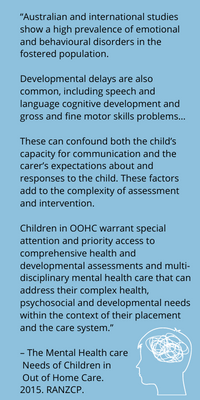About mental health for children in
out of home care
Children and young people living in Out-of-Home-Care (OOHC) have increased mental health vulnerabilities due to their often-complex history, which can include neglect, trauma, attachment difficulties and exposure to in vitro drug use.

Research shows that mental health problems of children in out of home care are between 2-5 times higher than the general population, however few receive professional mental health care.[1]
A 2007 study of children and adolescents in home-based foster care found:
- Externalising problems, such as attention problems, delinquent problems and social problems, were more common than internalising problems, such as anxiety and depression.
- Younger children had higher rates of attention problems and social problems than older children.
- Rates of serious suicide attempts were much higher than those reported for adolescents in the community
- A minority of those in foster care had received professional help for their problems.[2]
A growing body of research literature shows that with therapeutic intervention, emotional stability and security, the impacts of children’s early traumatic experiences can be overcome[3]. There is also early evidence of positive impact on young people for programs that strengthen the therapeutic capacities of carers and case managers[4].
[1] Sawyer, M., Carbone, J., Searle, A., and Robinson, P. 2007. ‘The mental health and wellbeing of children and adolescents in home-based foster care.’ The Medical journal of Australia 186(4):181-4
[2] Sawyer, M. Carbone, J., Searle, A., Robinson, P. 2007. The Mental Health and Wellbeing of Children and Adolescents in Home-Based Foster Care. The Medical Journal of Australia.
[3] Walsh, P., McHugh, M., Blunde, H., and Katz, I. 2018. ‘Pathways of Care Longitudinal Study: Outcomes of Children and Young People in Out of Home Care’ Research Report No. 6:83
[4] Herrman H, Humphreys C, Halperin S, et al. 2016. A controlled trial of implementing a complex mental health intervention for carers of vulnerable young people living in out-of-home care: the ripple project. BMC Psychiatry, 16(1):436. Accessed at: https://www.ncbi.nlm.nih.gov/pmc/articles/PMC5142401/
